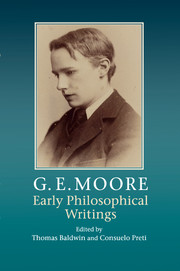Book contents
- Frontmatter
- Contents
- Preface
- Abbreviations and notes
- Editors' introduction
- THE 1897 DISSERTATION: THE METAPHYSICAL BASIS OF ETHICS
- EXAMINERS' REPORTS ON THE 1897 DISSERTATION
- H. S. on G. E. Moore, Dissertation on the Metaphysical Basis of Ethics
- Report on Mr. Moore's Essay
- THE 1898 DISSERTATION: THE METAPHYSICAL BASIS OF ETHICS
- EXAMINER'S REPORT ON THE 1898 DISSERTATION
- Index
Report on Mr. Moore's Essay
Published online by Cambridge University Press: 05 June 2012
- Frontmatter
- Contents
- Preface
- Abbreviations and notes
- Editors' introduction
- THE 1897 DISSERTATION: THE METAPHYSICAL BASIS OF ETHICS
- EXAMINERS' REPORTS ON THE 1897 DISSERTATION
- H. S. on G. E. Moore, Dissertation on the Metaphysical Basis of Ethics
- Report on Mr. Moore's Essay
- THE 1898 DISSERTATION: THE METAPHYSICAL BASIS OF ETHICS
- EXAMINER'S REPORT ON THE 1898 DISSERTATION
- Index
Summary
I have carefully gone over Mr. Moore's Essay and his article in Mind, and intend to criticize it so far as it is possible to do so without going into too great detail; but I should first wish to express my appreciation of his philosophical ability. This is the more necessary, as it is difficult to criticize without unduly emphasizing what one thinks to be defects.
I wish therefore to say that I think very highly of Mr. Moore's philosophical powers, especially of his power of following his ideas to their ultimate results. What one has most to fear in philosophy is that this should not be done, and therefore the weakness and strength of ideas should never be distinctly seen, but hidden under some plausible compromise. It is therefore very high praise to say that a writer on philosophy can, or does realise fully the consequences of his principles. By such thinking he may make a great contribution to philosophy, even if the result is that the principles break down; for they cannot do so without throwing light upon the relations of the element of truth which they exaggerate to the other elements of it.
Partly in consequence of this, but partly I think because Mr. Moore has not sufficiently studied how to be clear to those who are not looking at things at his precise angle; he is extremely difficult to understand.
- Type
- Chapter
- Information
- G. E. Moore: Early Philosophical Writings , pp. 99 - 114Publisher: Cambridge University PressPrint publication year: 2011



